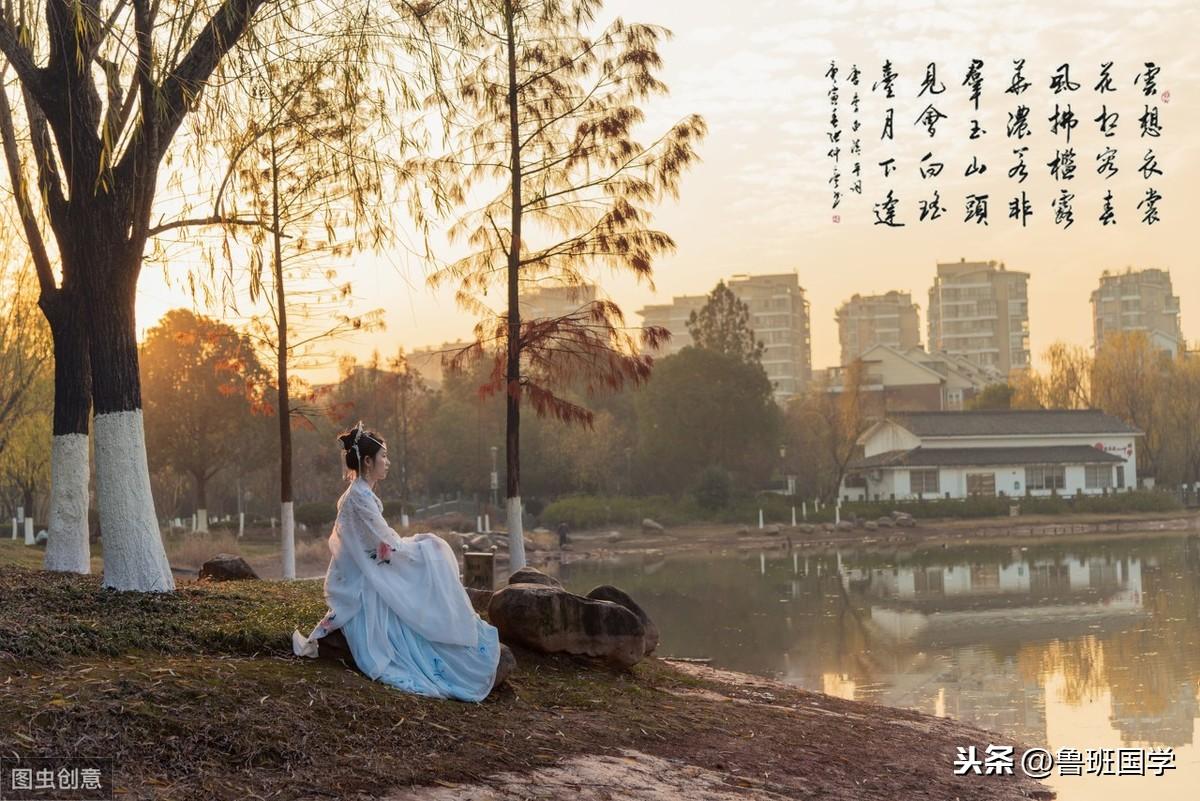Liu Yiqing (403-444), Han nationality, was born in Pengcheng (now Xuzhou, Jiangsu). Zi Jibo, a writer in the Northern and Southern Dynasties. Since childhood, he has outstanding talent and loves literature, and recruits scholars from all over the world to gather under his door. Liu Song's clan, succeeded as the king of Linchuan, and died in Jiankang (now Nanjing) in 444 AD (Yuanjia 21st year). In addition to "Shi Shuo Xin Yu", there is also a strange novel "You Ming Lu"
creative background
"Shi Shuo Xin Yu" mainly records anecdotes and mysterious talks of celebrities in the Wei and Jin Dynasties at that time. This "Chen Taiqiu and Youqi" is a record of the exchanges and conversations between celebrities at that time.

Chen Taiqiu and You Qi Xing
Chen Taiqiu and his friends are scheduled to go, and the date is mid-day. If you don't come in the middle, Taiqiu gives up, and even after you go. Yuan Fang was seven years old at the time, playing outside the school. The guest asked Yuan Fang: "Is your lord here?" He replied: "I have been waiting for you for a long time, so I have gone." The friend said angrily, "It's not human! If you want to do something with someone, you will go away by appointment." Yuan Fang said : "Your and your family's date is midday. If the midday is not here, it is unfaithful; it is rude to scold the father to the son." The friend was ashamed and got out of the car to lead him. Yuan Fang ignored it.
Translation:
Chen Taiqiu and his friend made an appointment to go together, and the appointed time was at noon. After noon, the friend had not arrived, so Chen Taiqiu stopped waiting for him and left. The friend did not arrive until Chen Taiqiu left. Yuan Fang was seven years old at the time and was playing outside the door. A friend of Chen Taiqiu asked Yuan Fang, "Is your father there?" Yuan Fang replied, "My father has been waiting for you for a long time, but you haven't arrived yet, and you have left." The friend said angrily, "You are really not a gentleman." Ah! I made an appointment to go with someone else, but I left them first.” Yuan Fang said, “You made an appointment with my father at noon, and if you didn’t arrive at noon, it’s not good faith; it’s rude to scold your father to your child.” Feeling ashamed, my friend got out of the car and tried to grab Yuan Fang's hand, but Yuan Fang walked into the house without looking back.

Comments:
Yuan Fang: that is, Chen Ji, the character Yuan Fang, the eldest son of Chen Shi.
Chen Taiqiu: Chen Shi (shí), courtesy name Zhonggong, was born in Yingchuan Xu (now Xuchang, Henan) in the Eastern Han Dynasty and served as the county magistrate of Taiqiu. Taiqiu: ancient place name.
Scheduled trip: Meet and go together. period, agreement.
Midday: The agreed time is noon. Midday, noon.
Over the middle: after noon.
Give up: leave without waiting. go, leave. She: give up, abandon.
Even: (friend) just arrived. Yes, just.
play: play.
Is the emperor there (fǒu): Is your father there? Zunjun, a respectful title for someone else's father. No, pass "No"
Jiajun: A humble word, calling people his father.
Citation: pull, I want to shake hands with Yuan Fang
Letter: Integrity, trustworthiness.
Year: The age at that time.
Non: No.
Resigned and gone: leave me and go; phase refers to the behavior of one party to the other, pronoun, with "zhi", I; appoint, leave, abandon.
Jun: A respectful title for the other party's father.
Gone: Already left.
Said: Say.
Then: it is.
Gu: Look back.
Ashamed: feel ashamed.

Ancient and modern synonyms:
1. Go Ancient meaning: leave; modern meaning: go, arrive.
2. Wei The ancient meaning: leave, abandon; the modern meaning: wronged, entrusted.
3.Gu ancient meaning: look back; modern meaning: take care of
Appreciation:
The full text of "Chen Taiqiu and Youqi" has only 103 words, but it tells a complete story (a debate about keeping promises and not keeping promises), portrays three characters with distinct personalities, and illustrates that in life, one should The truth of etiquette and trustworthiness. Such a limited text contains such a rich content, which can be described as concise and to the point. It is very difficult to achieve this if one does not have profound attainments in the refinement of language.
The refined language of "Chen Taiqiu and Youqi" is reflected throughout the article. At the beginning, the article clearly explained the matter, time, and cause with several key words such as "period", "during the date", "not to", "abandoned", and "even". In the explanation, two different characters (one is trustworthy and the other is not) are pushed to the readers at once.
At the end of the article, although there are only a few words, every word is brilliant. The three verbs "shame", "xia" and "yin" vividly portray the mentality and behavior of friends who know their mistakes and want to correct them. The stubbornness of Yuan Fang's contempt for "untrustworthiness" is also described vividly with the four words "human door, regardless". In the second layer (Zi scolding friends), which best embodies the central idea of the article, although the author uses much more pen and ink than the beginning and the end, the text is still very refined. As far as the narrative sentences are concerned, when the friend asked Yuan Fang, the emotion changed drastically from "asking" to "angry", which fully demonstrated the friend's rude character. When narrating Yuan Fang's criticism of his friends' anger, he used words such as "Answer" and "Yue" in a calm tone. role.
The theme of "Chen Taiqiu and Youqi" is mainly revealed through the dialogues of the characters. Although the dialogues of these characters are only a few words, the sentences are closely related to the center of the article and the character of the characters, with distinct personality characteristics. There are three sentences in the article about the dialogue between friends and Yuan Fang. The first sentence, "Is your lord here?" came straight to the point, the question was straightforward, without humility, showing the recklessness of the character. The second sentence is "inhuman!" To speak rudely and scold the father in front of the son, this is an act of impoliteness, and it shows the rudeness of the character. The third sentence "According to others, leave each other!" seems reasonable, but it is unreasonable. Instead of blaming yourself for the mistake of missing the appointment and delaying the date, you blame others and angrily scold the other party for the correct way of keeping the appointment, which further exposes the friend's unreasonable character traits.

There are also three sentences in the article about the dialogue between Yuan Fang and his friends. The first sentence "wait for you for a long time, but if you don't come, you have gone." This is an answer to a friend's casual conversation. Yuan Fang didn't answer the questions raised by his friends directly, whether he was there or not. Instead, first say "waiting for the king for a long time" and "not coming", and then "has gone", linking the father's "going" with "waiting for the king for a long time" and the friend's "not coming". This kind of answer not only clarified why my father left, but also prepared for the later criticism of my friend's anger, and there was something in the words, revealing my disgust for my friend's failure to make an appointment. The second and third sentences are rebuttals to your friends' unreasonable reprimands. The second sentence is "the king and the family are in the middle of the day, if the day is not there, it is unfaithful." This is aimed at friends who emphasize "scheduling". Keeping promises or breaking promises, the key lies in "the date is in the middle", "the date is not reached", of course it is breaking the promise. Grab the essence, hit the nail on the head,
Make friends lose the basis for refutation. The third sentence "It is rude to scold the father to the son." This is for a friend who speaks rudely. On the basis of pointing out that the friend is "untrustworthy", he also points out that the friend is "rude". Pressing one step at a time, the friend was put into an unspeakable embarrassment, so that he had to "get off the car and lead him" in the end. Because these dialogues have distinct personality characteristics, even though there are only a few short sentences, it can be seen how intelligent, benevolent, knowledgeable and reasonable the personality of Yuan Fang-Chen Taiqiu is.
The article "Chen Taiqiu and Youqi" is detailed and full of meaning. "Chen Taiqiu and You are going on a trip, the date is in the middle, and the time is not there. Taiqiu will leave, and it will be even after he goes." The family is expected to be in the middle of the day, but the middle of the day will not come" echoed. Friends "ask", "get angry", "ashamed", "get off the car and lead them", there are twists and turns. In the meantime, he first called "Zunjun" and suddenly said "inhuman". The characters' moods are lifelike. Yuan Fang "plays outside the door", answers one day at a time, "regardless of entry", responds freely, just like an adult, showing a distinctive personality and independent personality. Whether it's the ups and downs in the plot, the natural and vivid characters, or even the true temperament and candid quality hidden under the words, they are all worth pondering and savoring.
Articles are uploaded by users and are for non-commercial browsing only. Posted by: Lomu, please indicate the source: https://www.daogebangong.com/en/articles/detail/Appreciation%20of%20Classical%20Chinese%20for%20Junior%20High%20School%20Entrance%20Examination%20Chen%20Taiqiu%20and%20Youqiu%20telling%20people%20to%20be%20courteous%20and%20trustworthy%20when%20making%20friends.html

 支付宝扫一扫
支付宝扫一扫 
评论列表(196条)
测试